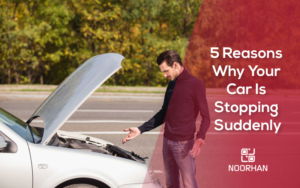Ever found yourself at a stoplight, and your car suddenly starts rumbling like it’s about to take off? It can be unnerving, right? You're not alone! Many drivers experience this strange phenomenon, and while it might seem harmless, understanding the reasons behind it is essential for keeping your vehicle in tip-top shape. Let’s delve into the common culprits behind those unsettling rumbles when you stop.
Understanding Car Rumbling Sounds

When your car rumbles while idling or coming to a halt, it's often a signal that something might be amiss. Here’s a breakdown of the most common reasons for this unsettling sound:
- Engine Misfires: One of the most common causes is engine misfiring. When not all cylinders ignite properly, you can feel your car shudder or rumble as it struggles to maintain a smooth performance. This can be caused by faulty spark plugs, fuel injectors, or even a dirty air filter. If you suspect a misfire, it’s wise to check your spark plugs or have a mechanic take a look.
- Exhaust System Issues: Another potential source of rumbling could be problems in your exhaust system. This includes leaks, rusted pipes, or damaged mufflers. A failing exhaust can lead to increased noise and vibrations that can resonate through your car. If your rumbling has an accompanying hissing or popping sound, it’s time for a thorough exhaust system inspection.
- Transmission Troubles: Problems within your transmission can also lead to rumbling noises when stopping. Issues like low transmission fluid can cause rough gear shifting and odd sounds. Make sure to keep an eye on your fluid levels and change them according to your car’s maintenance schedule.
- Brake Problems: Worn-out brake components can create rumbling sounds as well. If you hear a grinding noise alongside the rumble, your brake pads might be worn down, or the rotors could be damaged. Ensure you have your brake system checked regularly to avoid any potential safety hazards.
- Suspension Issues: Your vehicle's suspension plays a vital role in how your car handles. If there are issues with the shocks or struts, you might experience a rumbling sensation while stopping. This is because your car might not be absorbing bumps and vibrations properly, leading to unsettling sounds.
Keep in mind that while some rumbling sounds may not indicate a critical issue, they can lead to bigger problems down the line if left unchecked. Listening to your car and addressing these sounds promptly can save you from costly repairs and enhance your driving experience.
If you're experiencing persistent rumbling, don’t hesitate to consult a professional mechanic. They can pinpoint the exact issue and provide solutions to get you back on the road smoothly!
Also Read This: How to Create a Rumble Account and Join the Platform’s Growing Community
3. Common Causes of Car Rumbling When Stopping
If you’ve ever experienced your car rumbling when you stop, you might be wondering what’s going on under the hood. This unsettling sensation can stem from various issues, and it’s crucial to know what to look out for. Here are some of the most common culprits behind that rumbling noise:
- Worn Brake Pads: One of the most frequent offenders is worn-out brake pads. When they get too thin, they can cause a rumbling sound as they don’t grip the rotor properly. This can be exacerbated by debris caught between the pad and rotor.
- Brake Rotor Issues: A warped brake rotor can lead to uneven contact with the brake pads. If you notice a pulsing sensation in addition to the rumbling, your rotors might need resurfacing or replacement.
- Damaged Suspension Components: Your vehicle's suspension plays a significant role in how it handles stopping. If components like struts or shocks are worn or damaged, they can cause your car to rumble or vibrate during braking.
- Loose or Damaged Exhaust System: An exhaust system that’s loose or damaged can produce rattling or rumbling noises. When you stop, the vibrations can resonate throughout the car, amplifying the effect.
- Transmission Issues: Sometimes, the rumbling can be a sign of transmission problems that may arise when the vehicle is shifting gears or stopping. Pay close attention to whether it happens consistently or only under certain conditions.
- Wheel Bearings: Worn wheel bearings can create a rumbling noise as they struggle to support the wheel. A damaged bearing can become increasingly loud as you slow down, signaling a need for immediate attention.
Being aware of these common causes can help you determine if you need to take your car to a mechanic. Ignoring these sounds may lead to more extensive damage or an unsafe driving experience.
Also Read This: How Much Is Crash Team Rumble and What Does It Cost to Play?
4. How to Diagnose the Problem
Now that you have a clearer understanding of what might be causing your car to rumble, how do you go about diagnosing the problem? Here’s a step-by-step guide to help you get to the bottom of the issue:
- Listen Closely: Pay attention to when the rumbling occurs. Does it happen only when you brake, or does it persist while driving? Noting the specific circumstances can provide valuable insights.
- Visual Inspection: Safely raise your vehicle (if you’re comfortable) and inspect the brakes, rotors, and suspension components. Look for any visible signs of wear or damage.
- Check the Brake Pads: Measure the thickness of your brake pads. If they’re worn down to less than a quarter of an inch, it’s time for a replacement.
- Test Drive: Take your car for a short drive and monitor how it behaves. Notice any vibrations, pulling, or changes in noise when stopping.
- Professional Diagnosis: If you’re still unsure, it’s best to take your car to a trusted mechanic. They have the tools and expertise to run thorough diagnostics and identify problems that may not be easily visible to the untrained eye.
Diagnosing the issue promptly can not only save you money but also ensure your safety on the road. Don’t hesitate to address rumbling noises—your car will thank you for it!
Also Read This: How to Play Pokémon Rumble and Enjoy the Exciting Gameplay
5. Preventive Measures and Maintenance Tips
When it comes to keeping your car in tip-top shape and preventing those pesky rumbling noises when you stop, regular maintenance is key. Here are some preventive measures and maintenance tips that can help:
- Regular Inspections: Make it a habit to have your car inspected regularly. Your mechanic can check for worn-out brake components, suspension issues, and other elements that may contribute to rumbling noises.
- Brake Maintenance: Brakes are one of the primary sources of rumbling sounds. Ensure that your brake pads are in good condition and that the rotors are not warped. Replace worn brake pads promptly and consider resurfacing your rotors if they’re uneven.
- Tire Checks: Uneven tire wear can lead to a rough ride and unwanted noise. Rotate your tires regularly and check the alignment. This can minimize rumbling sounds when stopping.
- Suspension System Care: Pay attention to your car’s suspension system. If you notice clanking noises when stopping, it might be time for a suspension check. Replacing worn shock absorbers or struts can vastly improve your ride.
- Fluid Levels: Don’t overlook the importance of maintaining proper fluid levels, including brake fluid, power steering fluid, and transmission fluid. Low fluid levels can lead to increased friction and noise.
- Listen for Changes: If your car starts to make new noises, don't ignore them! Changes in sound are often the first indicator of a problem.
By incorporating these tips into your car care routine, you can significantly reduce the chances of your vehicle rumbling when you stop. Good maintenance not only keeps your car quiet but also enhances your safety on the road!
6. Conclusion
Experiencing a rumble when you stop your car is not just annoying; it can also indicate potential issues that need addressing. Whether it's worn brakes, uneven tires, or suspension problems, ignoring these sounds can lead to more significant repairs down the road. However, by staying on top of regular maintenance and being proactive in your car care, you can keep these noises—and the associated problems—at bay.
So, next time you hear that unwelcome rumble, don't brush it off. Instead, take it as a cue to check in with your vehicle. Regular inspections, prompt repairs, and good driving habits are essential for maintaining your car's health and ensuring a smooth, quiet ride.
Remember, a well-maintained vehicle can save you money in the long run and keep you safer on the road. Drive smart, stay informed, and let’s keep that rumble where it belongs—in a rock band!
 admin
admin








